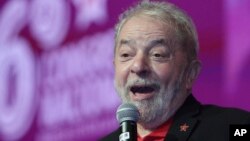Brazil's once all-mighty Workers Party, driven into the political wilderness by its fall from power in the midst of a massive graft scandal, is struggling to find its footing ahead of next year's general election.
Some analysts say the party is many years away from ever winning back the power it once firmly held.
But party members are optimistic, saying that their single biggest asset, the charisma of its founder and former Brazilian President Luiz Inacio Lula da Silva, remains a potent political force, despite Lula's facing five corruption trials.
A return of the PT, the Portuguese acronym by which the party is known, worries investors who fear it would reverse the unpopular fiscal reforms proposed in President Michel Temer's austerity drive.
At a convention this week aimed at rebuilding the party as an effective opposition to the Temer government, members waving red flags and chanting "Lula for President" clamored for him to run again next year, or earlier if the embattled Temer is ousted by one of Brazil's top courts.
"His popularity is unique in Brazil. No one else has the ability to mobilize the people like him. His candidacy will pull up the party and the left-wing social movement as a whole," Carlos Zarattini, the party's leader in the lower chamber of Congress, told Reuters.
A former union leader who led strikes in the early 1980s that helped dismantle a two-decade military dictatorship, Lula rose from poverty to the presidency on the back of his ability to electrify crowds at campaign rallies.
Opinion polls show Lula ahead for the 2018 race, though he is burdened by having the highest rejection rates among all potential hopefuls whose supporters would likely unite against him in a run-off.
The real question is whether he will make it to the start line. A conviction for corruption followed by the loss of a first appeal would disqualify him from running. A ruling in the first graft case against him is expected by July.
Lula has already said publicly that he wants to run in 2018, but has not yet made it official to avoid compounding his legal problems, aides said.
Rallying supporters at the PT convention on Thursday, the 71-year-old leftist leader made no mention of a presidential bid.
Instead, he portrayed the cases against him as political persecution by Brazil's elites who he said are undoing the social welfare policies that helped lift millions out of poverty during his time in office and that of his impeached successor Dilma Rousseff.
Lula called on the PT to join ranks around a new program that will reconnect the party with its roots in the working classes.
'A very weakened party'
That platform will be radical to recover support in the party's traditional base among workers and peasants, leaders said. It will include land reform opposed by the country's powerful farm lobby and a tax on wealthy Brazilians. The PT is also calling for legislation to "democratize" the media which the party says has hounded Lula because it is controlled by a small group of rich families.
"In this crisis, the PT is recovering its identity as the party of the working classes," said Julio Turra, a party founder and a leader of Brazil's largest labor confederation, the CUT, which represents 23 million workers.
He said the renewal of the PT will require self-criticism of mistaken economic policies of Rousseff that helped plunge Brazil into recession and caused widespread unemployment.
Analysts say the fall of the PT was so great that the party will take a long time to recover and will be in no shape to win an election any time soon.
In the 2016 municipal elections, which usually serve as a good indicator of the support in the next presidential race, the PT lost 60 percent of the mayor's offices it held, including Brazil's largest city, Sao Paulo.
"It is a very weakened party. The only thing it has left is Lula," said Claudio Couto, political science professor at the FGV think tank in Sao Paulo.
"It still has a capacity to mobilize people with Lula, who is perhaps the greatest mass leader Brazil has had," Couto said. "But if they launch his candidacy now and he gets banned, that would be worse for the party."







